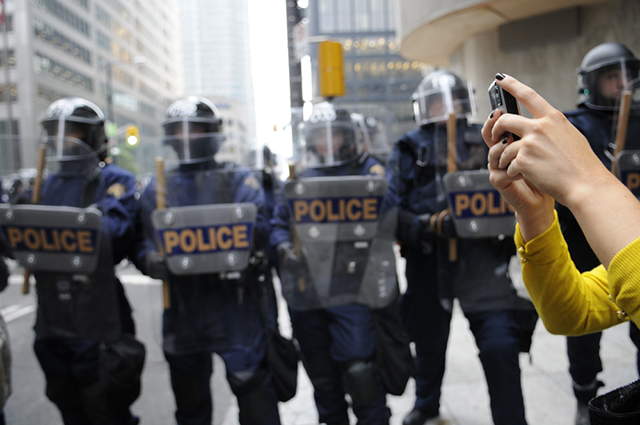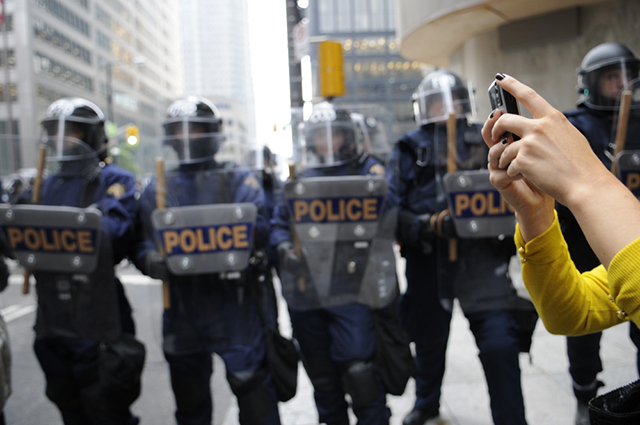
 Woman takes photos of Toronto Police during protest of 2010 G20 summit. (Photo: arindambanerjee / Shutterstock.com)
Woman takes photos of Toronto Police during protest of 2010 G20 summit. (Photo: arindambanerjee / Shutterstock.com)
With all of the controversy surrounding police misconduct and multiple deaths of unarmed citizens, you’d think that politicians would be trying to find new ways to increase police accountability. On the contrary, Texas is considering implementing a new law that would make it more difficult for residents to film the police.
State Representative Jason Villalba introduced House Bill 2918 in a supposed effort to help keep police officers safe. Although it does not explicitly forbid people from filming the police, it requires them to stand at least 25 feet away from police activity, thereby making the activity a lot more difficult. The 25 feet limit would be extended to 100 feet for civilians who wish to film and are also in possession of a firearm. Reporters for media outlets with an FCC license (i.e. NOT citizen journalists) would be exempt from the law.
Just this past week, an officer who killed an unarmed man in South Carolina claimed self-defense. The cop was likely to walk until video footage shot by an eyewitness showed a completely different reality, and now he faces murder charges. In Texas specifically, Hunt County police recently received criticism when home surveillance footage caught the officers punching and pinning a nearly nine-month pregnant woman to the ground. Incidents like these stress why filming the police is so important.
Due to a number of high-profile killings at the hands of police, several cities around the United States are exploring the option of uniforming police officers with body cameras to increase accountability. The law Texas is considering takes an opposite approach by potentially scaring would-be filmers away with a potential misdemeanor charge.
Rep. Villalba defended his legislation on social media, explaining, “[it] just asks filmers to stand back a little so as not to interfere with law enforcement.” While in the past that might have seemed like a reasonable concession, the timing of this bill makes it hard to interpret it as anything but an additional layer to help cover up gross police misconduct.
First, if a dangerous situation breaks out, not many amateur videographers are trying to get all that close to a volatile skirmish anyway, so it seems silly to assume that they would even want to get so close as to “interfere.” Second, if the individual who filmed Eric Garner’s death were forced to stand farther away, we’d never realize just how egregious this senseless killing was. Third, the more distance between the person with the camera and the police, the more ambiguity there is. LAPD has excused a recent killing by saying that the deceased reached for an officer’s weapon. Although the video of the killing does not exactly corroborate the police’s account, it’s not clear enough to say definitively that it did not occur.
The bottom line is that cameras are one of the best tools a nervous public has to protect against police abuses. Making laws to forbid or even impede on this right does the people of the United States a disservice, which is why federal courts have upheld the act as something protected by the First Amendment. If we live in a world of mass surveillance where the government tracks our every move, I don’t see what’s so unfair about turning around the lens and allowing the people to do some surveillance of their own.
Angry, shocked, overwhelmed? Take action: Support independent media.
We’ve borne witness to a chaotic first few months in Trump’s presidency.
Over the last months, each executive order has delivered shock and bewilderment — a core part of a strategy to make the right-wing turn feel inevitable and overwhelming. But, as organizer Sandra Avalos implored us to remember in Truthout last November, “Together, we are more powerful than Trump.”
Indeed, the Trump administration is pushing through executive orders, but — as we’ve reported at Truthout — many are in legal limbo and face court challenges from unions and civil rights groups. Efforts to quash anti-racist teaching and DEI programs are stalled by education faculty, staff, and students refusing to comply. And communities across the country are coming together to raise the alarm on ICE raids, inform neighbors of their civil rights, and protect each other in moving shows of solidarity.
It will be a long fight ahead. And as nonprofit movement media, Truthout plans to be there documenting and uplifting resistance.
As we undertake this life-sustaining work, we appeal for your support. Our fundraiser ends at midnight tonight! We still need 163 new monthly donors to hit our goal. Please, if you find value in what we do, join our community of sustainers by making a monthly or one-time gift.